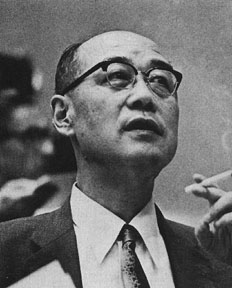Yukawa was born in Tokyo, Japan. In 1929, after receiving his degree from Kyoto Imperial University, he stayed on as a lecturer for four years. After graduation, he was interested in theoretical physics, particularly in the theory of elementary particles. In 1932, he married Sumi; they had two sons, Harumi and Takaaki. In 1933 he became an assistant professor at Osaka University, at age 26.
In 1935 he published his theory of mesons, which explained the interaction between protons and neutrons, and was a major influence on research into elementary particles. In 1940 he became a professor in Kyoto University. In 1940 he won the Imperial Prize of the Japan Academy, in 1943 theDecoration of Cultural Merit from the Japanese government. In 1949 he became a professor at Columbia University, the same year he received theNobel Prize in Physics, after the discovery by Cecil Frank Powell, Giuseppe Occhialini and César Lattes of Yukawa's predicted pion in 1947. Yukawa also worked on the theory of K-capture, in which a low energy electron is absorbed by the nucleus, after its initial prediction by G. C. Wick.
Yukawa became the first chairman of Yukawa Institute for Theoretical Physics in 1953. He received a Doctorate, honoris causa, from the University of Paris and honorary memberships in the Royal Society of Edinburgh, the Indian Academy of Sciences, the International Academy of Philosophy and Sciences, and the Pontificia Academia Scientiarum.
He was an editor of Progress of Theoretical Physics, and published the papers Introduction to Quantum Mechanics (1946) and Introduction to the Theory of Elementary Particles (1948).
In 1955, he joined ten other leading scientists and intellectuals in signing the Russell-Einstein Manifesto, calling for nuclear disarmament.
Solo violinist Diana Yukawa is a relative of Hideki Yukawa.


